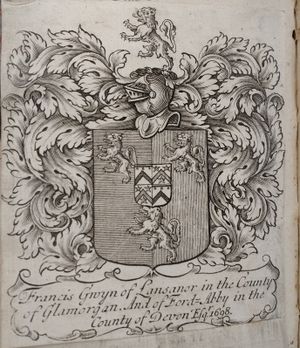Francis Gwyn 1648/9-1734
Francis GWYN 1648/9-1734
Biographical Note
Son and heir of Edward Gwyn of Lansanor, Glamorganshire, and Eleanor, youngest daughter of Sir Francis Popham of Littlecott, Wiltshire, he was born at Combe Florey, Somerset, in 1648 or 1649. He matriculated at Christ Church, Oxford, 1 June 1666, and became a student of the Middle Temple. He was called to the Bar but later turned to politics and, between 1673 and 1727, was a Member of Parliament representing several constituencies, including Cardiff, 1685-7. A Tory and an intimate friend of Laurence Hyde he held important offices and was secretary at war, 1713-14. He was appointed chamberlain of Brecon, 15 October 1681. By his marriage with Margaret, third daughter of Edmund Prideaux, he acquired the Ford Abbey estates in Devon. After the accession of George I, Gwyn continued in the Commons, but his parliamentary activity greatly declined. He had long been an enthusiastic amateur historian and antiquarian and was a close friend of Robert Harley (founder of the Harleian Collection in the British Library) with whom he exchanged many letters. In the 1690s he had been a leading patron of the Welsh scholar Edward Lhwyd, and he introduced his fellow MP and antiquary Narcissus Luttrell to Harley. After 1715 this hobby increasingly claimed him. He died on 14 June 1734 at Forde Abbey and was buried in the chapel there. He was succeeded by a son, Francis Gwyn, who died childless, and on his decease the Llansannor property passed to Anthony Gwyn, a cousin. After him the family of Gwyn, a branch of the Herberts, became extinct.
Books
Gwyn used an engraved armorial bookplate, Franks 13144.
There are at least five of his books in Cardiff University Library Special Collections, and more may be found when their cataloguing project is complete. The extent and disposition of his library at Llansannor Court, which still stands, are not known. Gwyn’s antiquarian collections, survived at Forde Abbey until their dispersal by sale in 1846. This may have included some of his books, although it seems likely that he also retained a library on his Welsh estate.
Sources
- Will of Francis Gwyn, Dorset History Centre D-FAE/F/22
- Brooks, Colin. "Gwyn, Francis (1648/9–1734), politician and government official." Oxford Dictionary of National Biography.
- Gambier Howe, E. R. J. Franks bequest: catalogue of British and American book plates bequeathed to the … British Museum. London, 1903.
- Jenkins, P. Francis Gwyn and the birth of the Tory Party, Welsh History Review 11 (1983), 283 - 301.
- History of Parliament
- Dictionary of Welsh Biography
